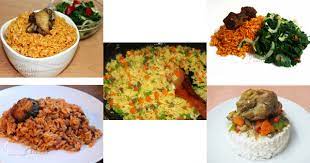Nigeria is a country with a rich culinary heritage. One of the most popular and beloved dishes in the country is rice. Nigerian rice is a staple food that is enjoyed by millions of people every day. In this blog post, we will explore the origin of Nigerian rice, its ingredients and spices, types of popular Nigerian rice, how to prepare it, and its nutritional and health benefits.
Origin of Nigerian Rice
Rice is not native to Nigeria, but it has become a staple food in the country over the years. The first recorded importation of rice to Nigeria was in the 1500s by the Portuguese. Over time, rice became more popular in Nigeria and was eventually grown locally. Today, Nigeria is one of the largest producers of rice in Africa.
Ingredients and Spices
The ingredients for Nigerian rice can vary depending on personal preferences and regional variations. Common ingredients used in Nigerian rice include rice, meat or fish, vegetables (such as tomatoes, onions, and peppers), and spices such as thyme, bay leaves, curry powder, and ginger.
Types of Popular Nigerian Rice
Nigeria is a country that is well known for its love of rice. Rice is a staple food in Nigeria, and there are several different types of rice that are popular throughout the country. There are several popular types of Nigerian rice that are enjoyed across the country.
There are several popular types of Nigerian rice, each with its own unique flavor and preparation method. From the spicy and flavorful Jollof Rice to the sweet and savory Coconut Rice, Nigerian rice offers something for everyone. Ofada Rice, a local variety of rice, is also a popular choice, often served with a spicy sauce made from peppers and onions.
Popular Nigerian Rice
These types of rice are typically named after the region in which they are grown or after the way in which they are prepared. Some of the most popular types of Nigerian rice include:
- Ofada Rice: Ofada rice is a locally grown rice that is native to the southwestern part of Nigeria. It is often served with a spicy sauce made from peppers and onions and is typically eaten with the hands.
- White Rice: White rice is a common type of rice that is widely eaten throughout Nigeria. It is typically served with stews or soups and can be flavored with a variety of spices.
- Jollof Rice: Jollof rice is perhaps the most well-known type of Nigerian rice. It is a one-pot dish that is made by cooking rice with tomato paste, onions, and a variety of spices. Jollof rice can be served with a variety of meats or vegetables.
- Fried Rice: Fried rice is a popular dish in Nigeria, it is typically made by stir-frying rice with vegetables such as carrots, peas, and onions, and adding meat or shrimp also It can also be made with leftover rice that is fried with vegetables and meat. It is often served as a side dish or as a main meal.
- Coconut Rice: Coconut rice is a sweet and savory dish that is made by cooking rice with coconut milk and a variety of spices. It is often served with seafood or chicken.
- Tuwo Rice: Tuwo rice is a type of rice that is typically eaten in northern Nigeria. It is made by boiling rice until it becomes soft and then mashing it until it becomes a thick porridge. It is often served with a spicy soup made from meat or vegetables.

Nutritional and Health Benefits of Nigerian Rice
Nigerian rice is a nutritious and healthy food that provides the body with essential nutrients.
Here are some of the top reasons why incorporating Nigerian rice into your diet can be beneficial:
- Rich in Carbohydrates: Rice is a good source of carbohydrates, which are an essential source of energy for the body. Nigerian rice provides a steady supply of carbohydrates that help to keep the body energized throughout the day.
- Good Source of Protein: Nigerian rice is also a good source of protein, which is important for the growth and repair of muscles and tissues. Protein also helps to keep you feeling full for longer periods of time.
- Low in Fat: Nigerian rice is generally low in fat, making it a good option for those who are watching their fat intake. It is also low in cholesterol and sodium, which can help to reduce the risk of heart disease and stroke.
- High in Fiber: Nigerian rice is high in fiber, which is important for maintaining a healthy digestive system. Fiber also helps to regulate blood sugar levels and can reduce the risk of developing type 2 diabetes.
- Rich in Vitamins and Minerals: Nigerian rice is a good source of vitamins and minerals, including thiamin, niacin, and iron. Thiamin and niacin are important for the metabolism of carbohydrates, while iron is important for the production of red blood cells.
- Boosts Energy Levels: Nigerian rice contains a good amount of B vitamins, which are important for energy metabolism. These vitamins help to convert food into energy, which can help to improve energy levels and reduce fatigue.
Conclusion
In conclusion, these are just a few of the most popular types of Nigerian rice. Each type of rice has its own unique flavor and preparation method, and they are all delicious in their own way. Whether you’re looking for a spicy and flavorful dish like Jollof rice or a sweet and savory dish like coconut rice, Nigerian rice is sure to satisfy your taste buds.
Nigerian rice is not only a delicious and versatile food, but it also has several nutritional and health benefits. Incorporating Nigerian rice into your diet can help to provide you with the energy and nutrients your body needs to stay healthy and strong.

